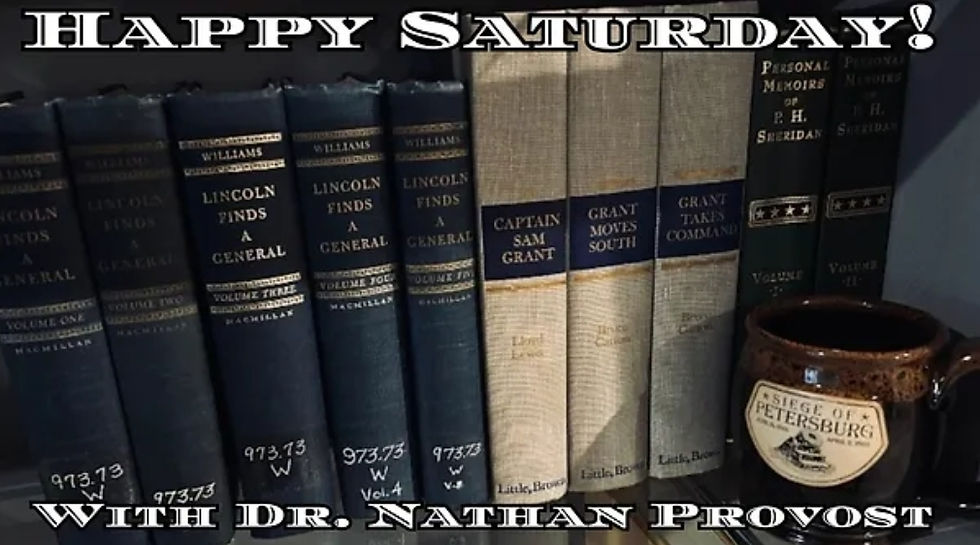Cratering Expectations? Happy Saturday!
- darrenscivilwarpag8
- May 11, 2024
- 3 min read

This week, I finally celebrate my acquisition of a doctorate. I have my hooding ceremony today. I could not be more excited as I celebrate with my advisor and family. I also recently learned how close Union forces came to capturing Van Dorn’s Army of West Tennessee in the Fall of 1862. There were a couple of occasions in which the Union army could have enveloped the enemy forces despite taking a beating at Second Corinth and Iuka. Tactical decision-making is always secondary to operations, as the larger goal should be the priority. It is always more risky, but it does end a campaign or war more quickly than a protracted bloody conflict. Grant and Lincoln certainly saw this possibility in the Summer of 1864.

Following the Battle of the Crater in late July of 1864, Grant sent the following order to General George Meade, “Get all the heavy artillery in the lines about Petersburg moved back to City Point as early as possible. It is improbable that the necessity will arise for sending two more corps there.” The question arises of whether Grant thought Lincoln would give up hope following the devastating loss at the Crater and began sending back siege guns to City Point. This plan was obviously given up following the actions taken in August. However, this question should be addressed based on the events at the time.
Grant arrived at Petersburg with a portion of his army on June 15, 1864, after a brilliant march from Cold Harbor. They failed to take the city but took many interior lines threatening its vicinity. Grant extended his lines, seeing how far he could circumvent the town with the men available. Lee pushed back Union forces away from the outer lines of the city but could not stop Grant from extending his lines after a botched attack against the Union line on June 24. Grant then agreed to lay siege to the city despite only having partial possession of the outer lines. Therefore, Grant’s maneuver warfare came to a standstill. Nevertheless, good progress was made against the city as Union forces began mining underneath Confederate entrenchments. Grant sent forces north of the James River to distract Lee in the First Battle of Deep Bottom, successfully shifting Confederate forces away from Petersburg.

Meanwhile, Jubal Early wreaked havoc in the Shenandoah Valley. He defeated David Hunter’s force at the Battle of Lynchburg on June 18, 1864. Lee was unsure if Early should return to the Army of Northern Virginia or let him go on the offensive. He let Early decide on the matter. Early stayed in the Valley, threatening Washington D.C. and almost slipping past Union intelligence. Grant managed to send parts of the Sixth Corps north and later the whole corps to support Union forces near Washington D.C. and the Shenandoah Valley. These events did not stop Early’s offensive movements by late July 1864.

Following the failed assault, Grant worried about an impending sortie made by Confederate forces just north of the James River, writing to Butler, “The enemy seems to be in small force they may hasten reinforcements take everything from your front, if they do follow in & seize & hold the Road to the last informing me that I may take steps to strengthen you in time…I am much in hope it is still time to succeed.” Grant wanted to strengthen his entire front as it was not infeasible for Lee to take the offensive, as proven by his actions on June 24, 1864. Meade reached out to Grant for instructions on the matter, “Genl. Hunt desires to know whether your order includes the siege guns on Ords front & along the Appomattox river. I presume it does, but desire positive instructions.”

From this interaction, Grant instructed all siege guns to City Point. It was not that Grant expected Lincoln to give up on the siege, but it was to provide a staunch defense against a possible Confederate attack. There is also the strong possibility of wanting to reinforce Washington D.C. after Early threatened Washington at the beginning of July. Lincoln and Grant sparred over who should take on the difficult task of flushing Early out of the Shenandoah Valley, but Lincoln never gave up on Grant nor vice versa. Even in Lincoln’s darkest days in mid-August, when he passed along his blind memorandum, did he ever consider Grant’s blockade operations? Meanwhile, Grant held on with a bulldog grip and continued believing in total victory and Lincoln’s faith in him, leading to the successful capture of the Weldon Railroad in late August.







Comments